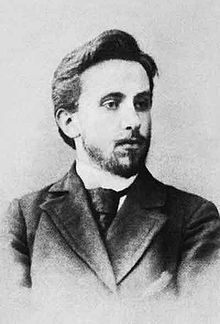Alexander Antonowitsch Kurssinsky
Alexander Antonovich Kurssinski ( Russian Александр Антонович Курсинский ; born May 10 . Jul / 22. May 1873 greg. In Kiev , † 1919 ) was a Russian poet of the younger symbolism , translator and literary critic of Polish origin.
Life
Kurssinski came from an unpaid middle-class family. From 1883 he lived in Moscow . He attended the 3rd Moscow high school (graduated in 1891) and then studied at the historical - philological faculty of Moscow University (graduated in 1896). Then he graduated from the Kiev military school in 1897. He was polyglot and spoke English , French , German , Italian , Bulgarian , Polish and other languages.
Kurssinski was one of the most famous figures of the younger symbolism. From 1894 he was close friends with Konstantin Dmitrijewitsch Balmont and Valeri Jakowlewitsch Brjussow . With them and Vladimir Maximovich Fritsche , Konstantin Antonovich Chlebowski, Vladimir Mikhailovich Schuljatikow and Pyotr Semyonovich Kogan , he founded the Circle of Friends of the 1894 Western European literature , whose secretary he was at the meetings.
From the summer of 1895 to 1896 Kurssinski lived in Yasnaya Polyana , where he was a tutor for Lev Nikolayevich Tolstoy's son Mikhail. He then served with interruptions in the Imperial Russian Army , from which he resigned as staff captain in 1911 . He then taught Russian literature at high schools in Serpukhov and Moscow. He worked for the art and literary magazine Solotoje Runo ( La Toison d'or ) published by Nikolai Pawlowitsch Rjabuschinski and tried to publish his own magazine.
Kurssinski has translated works by Oscar Wilde , Thomas Moore , Percy Bysshe Shelley , Edgar Allan Poe , Henry Wadsworth Longfellow , Charles Baudelaire and others into Russian. His literary critical essays appeared in magazines of the most diverse directions, including the Solotoje Runo . His poems appeared in anthologies in 1896 and 1901. The volume, published in 1906, contains his own poems, prose and translations. He wrote the novel Chmuroje Nebo (Cloudy Sky) and scripts .
At the beginning of the First World War , Kurssinski was drafted and served in the military censorship department . He was then assistant and editor of the Army Post newspaper . He also took part in fights and received awards. In 1919 he returned to Kiev.
literature
- Anna Kovalova / Arina Ranneva: Symbolism in Early Russian Cinema and the Ghostwriter Aleksandr Kursinskii . In: The Russian Review , Vol. 79, (2020), No. 3, pp. 366-388.
Web links
- Literature by and about Alexander Antonowitsch Kurssinski in the bibliographic database WorldCat
Individual evidence
- ↑ a b c d e University of Moscow: Александр Курсинский (accessed on September 21, 2019).
- ↑ Ofizery RIA: Курсинский Александр Антонович (accessed September 21, 2019).
- ↑ Век перевода: АЛЕКСАНДР КУРСИНСКИЙ (accessed on September 21, 2019).
- ↑ А. Курсинский: Полутени. Лирические стихотворения за 1894 и 95 гг. II. Из Томаса Мура мелодии. Перевод с английского . Печатня А. И. Снегиревой. Остоженка, Савеловский пер., Соб., Moscow 1896 ( Wikisource [accessed September 21, 2019]).
| personal data | |
|---|---|
| SURNAME | Kurssinski, Alexander Antonowitsch |
| ALTERNATIVE NAMES | Курсинский, Александр Антонович (Russian) |
| BRIEF DESCRIPTION | Russian poet, translator and literary critic |
| DATE OF BIRTH | May 22, 1873 |
| PLACE OF BIRTH | Kiev |
| DATE OF DEATH | 1919 |
| Place of death | Kiev |
